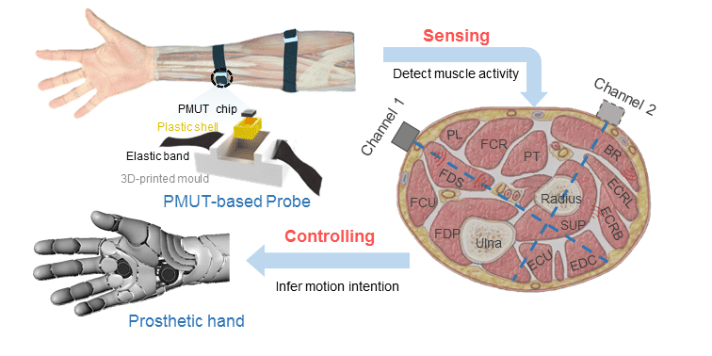Ultrasound provides a possible alternative to surface electromyography (sEMG) for prosthetic manipulation, but current systems with medical probes are expensive, bulky and non-wearable. This work presents a new approach to prosthetic control by developing a novel wearable A-mode ultrasound system constructed from Piezoelectric Micromachined Ultrasound Transducers (PMUTs). The research comprises two main sections: the construction of the wearable ultrasound system using PMUTs and a proof-of-concept study demonstrating its efficacy in gesture recognition.
The designed probe consists of a PMUT chip wire-bonded and fixed on a customized mold, encapsulated with Ecoflex to create a miniaturized wearable probe. Two of the compact probes are placed on the forearm of a subject and collect pulse-echo signals generated by the muscles. The captured signals are then used to accurately predict different hand gestures, achieving an impressive accuracy of approximately 96%.
This innovative strategy simplifies the sensing probe by utilizing only two PMUT chips instead of traditional medical probes, thereby reducing complexity and cost. Furthermore, the use of pulse-echo signals for gesture recognition eliminates the need for complex processing circuits and imaging algorithms, simplifying the control of prostheses.
The presented PMUT-based system offers several advantages, including its small size, light weight, low cost, and seamless integration with prosthetic devices. Compared to existing ultrasound-based methods, this approach eliminates the requirement for ultrasound gel, making it a more convenient and user-friendly choice.
This study represents a significant step forward in the field of prosthetic control by providing comparable accuracy while significantly reducing the number of channels, processing circuitry, and analysis requirements. The findings have the potential to make prosthetic devices more practical and affordable, ultimately improving the quality of life for people with limb loss.

